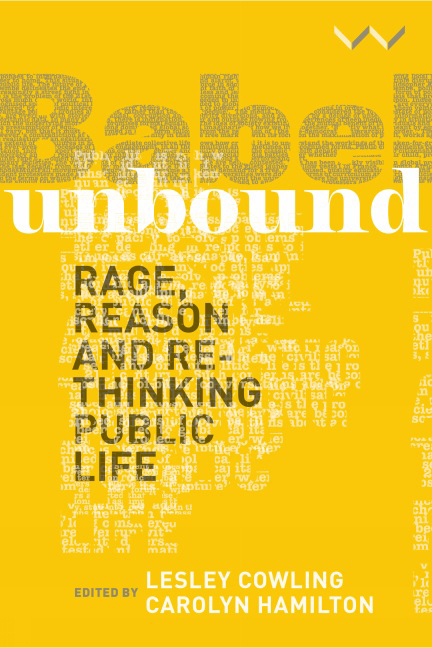48 results
Chapter 3 - Fluidity and Its Methodological Openings: Mobility and Discourse on the Eve of Colonialism
-
-
- Book:
- Reading from the South
- Published by:
- Wits University Press
- Published online:
- 01 March 2024
- Print publication:
- 01 August 2023, pp 57-74
-
- Chapter
- Export citation
Global population and conservation status of the Great Black-backed Gull Larus marinus
-
- Journal:
- Bird Conservation International / Volume 33 / 2023
- Published online by Cambridge University Press:
- 05 August 2022, e23
-
- Article
-
- You have access
- Open access
- HTML
- Export citation
Refiguring the Archive for Eras before Writing: Digital Interventions, Affordances and Research Futures
-
- Journal:
- History in Africa / Volume 49 / June 2022
- Published online by Cambridge University Press:
- 04 May 2022, pp. 131-157
-
- Article
- Export citation
Chapter 1 - Recalibrating the Deep History of Intellectual Thought in theKwaZulu-Natal Region
-
-
- Book:
- Public Intellectuals in South Africa
- Published by:
- Wits University Press
- Published online:
- 16 July 2022
- Print publication:
- 01 July 2021, pp 21-43
-
- Chapter
- Export citation
Chapter 2 - Tracing Public Engagements in Visual Forms
-
-
- Book:
- Babel Unbound
- Published by:
- Wits University Press
- Published online:
- 10 September 2020
- Print publication:
- 01 May 2020, pp 40-63
-
- Chapter
- Export citation
Index
-
- Book:
- Babel Unbound
- Published by:
- Wits University Press
- Published online:
- 10 September 2020
- Print publication:
- 01 May 2020, pp 265-283
-
- Chapter
- Export citation
Frontmatter
-
- Book:
- Babel Unbound
- Published by:
- Wits University Press
- Published online:
- 10 September 2020
- Print publication:
- 01 May 2020, pp i-iv
-
- Chapter
- Export citation
Contributors
-
- Book:
- Babel Unbound
- Published by:
- Wits University Press
- Published online:
- 10 September 2020
- Print publication:
- 01 May 2020, pp 261-264
-
- Chapter
- Export citation
Chapter 1 - Rethinking Public Engagement
-
-
- Book:
- Babel Unbound
- Published by:
- Wits University Press
- Published online:
- 10 September 2020
- Print publication:
- 01 May 2020, pp 21-39
-
- Chapter
- Export citation
Chapter 6 - Archive and Public Life
-
-
- Book:
- Babel Unbound
- Published by:
- Wits University Press
- Published online:
- 10 September 2020
- Print publication:
- 01 May 2020, pp 125-143
-
- Chapter
- Export citation
Introduction
-
-
- Book:
- Babel Unbound
- Published by:
- Wits University Press
- Published online:
- 10 September 2020
- Print publication:
- 01 May 2020, pp 1-20
-
- Chapter
- Export citation

Babel Unbound
- Rage, Reason and Rethinking Public Life
-
- Published by:
- Wits University Press
- Published online:
- 10 September 2020
- Print publication:
- 01 May 2020
Contents
-
- Book:
- Babel Unbound
- Published by:
- Wits University Press
- Published online:
- 10 September 2020
- Print publication:
- 01 May 2020, pp v-vi
-
- Chapter
- Export citation
Acknowledgements
-
- Book:
- Babel Unbound
- Published by:
- Wits University Press
- Published online:
- 10 September 2020
- Print publication:
- 01 May 2020, pp vii-viii
-
- Chapter
- Export citation
Hospital avoidance: an integrated community system to reduce acute hospital demand
-
- Journal:
- Primary Health Care Research & Development / Volume 20 / 2019
- Published online by Cambridge University Press:
- 29 October 2019, e144
-
- Article
-
- You have access
- Open access
- HTML
- Export citation
14 - Conclusion
-
-
- Book:
- The Politics of Heritage in Africa
- Published online:
- 05 March 2015
- Print publication:
- 02 March 2015, pp 252-260
-
- Chapter
- Export citation
Notes on Contributors
-
-
- Book:
- The Politics of Heritage in Africa
- Published online:
- 05 March 2015
- Print publication:
- 02 March 2015, pp xi-xiv
-
- Chapter
- Export citation
Backstory, Biography, and the Life of the James Stuart Archive1
-
- Journal:
- History in Africa / Volume 38 / 2011
- Published online by Cambridge University Press:
- 09 May 2014, pp. 319-341
-
- Article
- Export citation
Endnotes
-
- Book:
- Becoming Worthy Ancestors
- Published by:
- Wits University Press
- Published online:
- 21 March 2018
- Print publication:
- 27 November 2011, pp 145-156
-
- Chapter
- Export citation
Frontmatter
-
- Book:
- Becoming Worthy Ancestors
- Published by:
- Wits University Press
- Published online:
- 21 March 2018
- Print publication:
- 27 November 2011, pp i-iv
-
- Chapter
- Export citation



